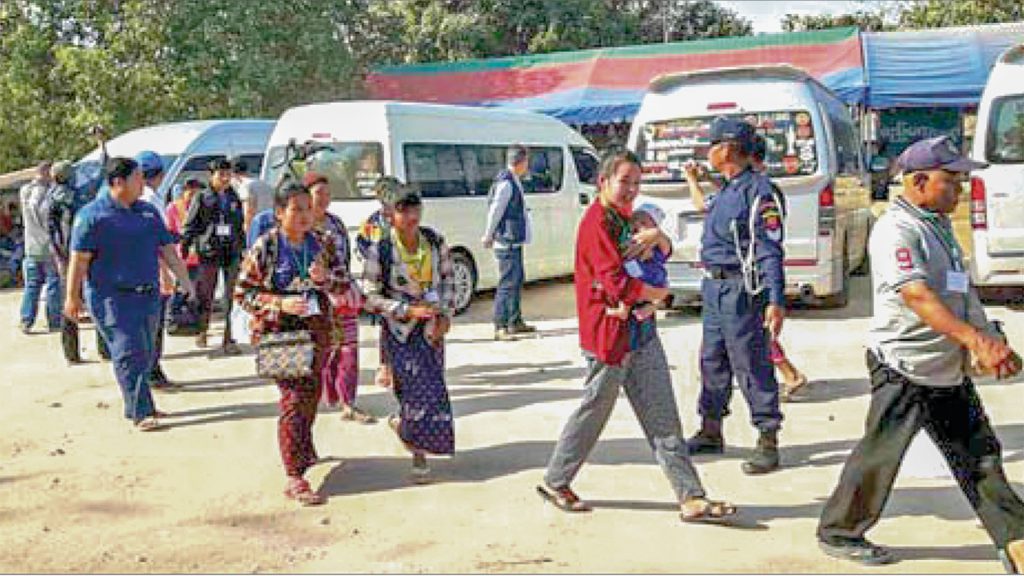28 July
The following is an interview with U Win Shein, Director-General of the Department of Labour, on the work and assistance they have provided towards Myanmar migrant workers abroad, continued from yesterday.
Q: Could you tell us the assistance provided for Myanmar workers in Thailand whose documents will expire soon.
U Win Shein: Both countries have discussed about Myanmar workers currently in Thailand who are either undocumented or whose documents are about to expire. The agreement
The previous agreement between both countries for Myanmar workers currently in Thailand who are either undocumented or whose documents are about to expire was to provide them with the required documents. But now, the Thai government will only accept workers resent under the MoU system.
We negotiated with Thailand to extend the deadline for workers whose documents will expire in November 2019 and 31 March 2020 to 31 March 2022 but the Thai government will only extend the date to 31 December 2020. As a result, these workers will have to reenter Thailand under the MoU system when their documents become invalid.
Q: Can you explain that reentry with the MoU system in detail?
U Win Shein: Well, both countries signed an MoU on cooperation in hiring workers back on 21 June 2003 in Chiang Mai. Our foreign ministers signed that. Then on 24 June 2006, our labour ministers signed an MoU for cooperation on labour affairs and employment contracts during a meeting in Bangkok.
We are working with 106 overseas employment agencies for Thailand to send our workers legally under the MoU system. We have send 707,472 workers to Thailand that way between June 2010 to May 2019.
The Thai labour attache sends us a list of employers and vacancy announcements verified by their labour department. We submit it to the committee on education, health and human resource development and once they pass approval we move on to forming employment contracts.
We then send a list of Myanmar workers who have signed contracts to the Thai labour department so that they can apply for visas and work permits. And when they give the green light, we send our workers over to Thailand through the migrant worker office in Myawaddy.
Q: What about sending workers to the fishery sector in Thailand? That’s also with the MoU system, right?
U Win Shein: Fishermen from Taninthayi and Ayeyawady regions and Rakhine State are well experienced and can go legally work in Thailand under the MoU system too.
The MoU – U Turn system allows for fishermen to reenter Thailand legally and so far, we have resend 95 workers.
Q: What are some points of etiquette, do’s and don’ts, for workers going abroad for employment?
U Win Shein: I’d like to advise them to avoid brokers that don’t have any legal license to send people overseas. Contact an authentic agency instead. Otherwise, you run the risk of having your pay docked, swindled or your person trafficked.
There are brokers who lie to you about jobs in Thailand and then taking you through an illegal route to sell you as labour, deal in human trafficking or forcing you into factories and workshops. We’re cooperating with everyone concerned to uncover these crimes.
If you enter a country illegaly then you will get prosecuted by that country’s existing laws. So, be careful about that. Conversely, legal entry entitles you to the rights and protection outlined in that country’s laws. As a result, it’s easier for diplomats and Myanmar embassies to help you with any issues you may have over there.
Some of the most prevalent issues we have right now are workers losing large sums of money because brokers cheated them by demanding prepayments and then not sending them abroad. This also leads to situations where the worker is sent somewhere different from where they were told, or workers not receiving clear explanations on their contracts leading them to unknowingly breach some rules.
Some people believe everything the brokers tell them and do anything they’re told to. They may also return from Thailand because they’re not fit for the work they have applied for. They may not have taken enough time to research that fact, so they come back having wasted their time and money. It’s disheartening to see this taking place.
This is why we urge people to find employment directly through licensed agencies and the labour department can acquire the contact number and address from the service area.
We also urge workers to listen carefully to explanations on the employment contract from either the agencies, employer’s representatives or the officials from the migrant worker offices in Myawaddy and Kawthoung. Only sign the contract if you have fully understood it and accept it.
Now, there can also be problems arising from differences in language, geography and food. They can also run into misunderstandings with their employer or the workplace manager.
The majority of our people only get hired as general labour because they either lack basic education or the necessary skills for more sophisticated work, and as a result they get paid low wages. They may also develop health issues that prevent them from working for long periods.
Q: What have you been collaborating on with other countries and organizations for workers’ affairs?
U Win Shein: Like I’ve said before, we negotiate worker’s legal rights and protection in the country they will be working in. We’re also collaborating with IOM, ILO and UN Women on the same migrant worker affairs. Similarly, we coordinate with our embassies and other relevant organizations on this matter.
Translated by Pen Dali



